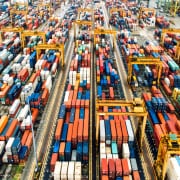|
Getting your Trinity Audio player ready...
|
Yesterday Transparency International (TI) released the 2018 edition of its Exporting Corruption report, following on the previous edition published back in 2015. For South Africa, not much has changed for the better.
Exporting Corruption 2018 rates countries on their enforcement against foreign bribery under the Organisation for Economic Co-operation and Development’s (OECD) Anti-Bribery Convention. The OECD convention requires signatory countries to criminalise bribery of foreign public officials and introduce related measures.
South Africa was one of 40 signatory countries surveyed, along with four other major non-OECD exporters – China, India, Hong Kong and Singapore. All together, the 44 countries are responsible for more than 80% of world exports. The countries were assessed according to available data from the past four years, relative to their share of global exports, and then ranked in four categories: ‘Active’, ‘Moderate’, ‘Limited’, and ‘Little or No’ enforcement.
South Africa is one of 11 countries classified as having limited enforcement, the same achievement as three years ago. The others are France, Greece, Hungary, Netherlands, New Zealand, Portugal, South Korea and Sweden.
Four countries fall into the active enforcement category and six into the moderate enforcement category. The most densely populated category is that of little or no enforcement, with 20 countries.
South Africa retained its mediocre status because just 15 formal foreign bribery investigations were opened between 2014 and 2017. Of those, three cases were closed as at December 2017 and to date there have been no convictions for foreign bribery.
The OECD pointed to lack of transparency of data, especially data relating to foreign bribery enforcement in the country, as a factor in this situation. Other factors include a lack of capacity to detect, monitor and investigate foreign bribery and inadequate policy in addressing foreign bribery.
‘Slap on the wrist’ not enough
The OECD also raised concerns about the ease with which settlements and plea bargain arrangements are entered into in South Africa. This is not much of a deterrent, especially for companies with big budgets and for whom a fine is hardly felt. For example, the parliamentary Standing Committee on Public Accounts (Scopa) noted that 41 of the anti-corruption task team’s 42 successful corruption cases have ended with plea bargains and reduced sentences.
Most of these cases involved amounts ranging from R5-million and R89-million. In two cases a sum of more than R1-billion was involved. Members of the committee decried the “slap on the wrist” given to serial corrupters.
Scopa chairperson Themba Godi said in a statement after this revelation: “None of the cases were fully prosecuted through convictions, meaning that all of them are outcomes where corrupt people have negotiated their way out of prison, which largely defeats the objective of using sentencing as a deterrent against corruption.”
Slim prospects for whistle-blowers and allies seeking assistance
Besides South Africa’s failure to make significant progress on convictions of foreign bribery, poor awareness of whistle-blower protections was pointed out by the OECD as a further weakness. Despite the introduction of the Protected Disclosures Amendment Act, no concrete steps have been taken to ensure that reporting can occur without fear of reprisal.
In the OECD’s 2016 report following up on its recommendations, it stated that this was “particularly concerning in an environment where there was a public perception of serious reprisals against whistle blowers”.
Mutual legal assistance (MLA) is another area where South Africa could improve. In the 2016 report, it was noted that the country had taken positive steps with respect to MLA – but of the incoming requests for assistance, 49 out of 54 had not been acted on and South Africa had used MLA in connection with just one of its ongoing investigations.
“Although we agreed to the OECD Commitments in 2007, we have not been able to convict anyone for foreign bribery and our co-operation in relation to mutual legal assistance remains limited,” said Leanne Govindsamy, head of legal and investigation at Corruption Watch. “This is reflected in our presence in the limited enforcement category in TI’s report.”
South Africa has co-operated internationally in certain cases, such as the foreign bribery investigation involving Israeli entity Nikuv (NIP Global), alleged to have bribed Lesotho government officials in order to secure Lesotho government contracts. Israel later advised the OECD WGB that had it not been for the assistance provided by South Africa, it would not have been able to finalise the case.
Improvements to legislation
South Africa has made significant strides in improving legislation over the last two years. In 2017, a bill was tabled in Parliament to amend the Prevention and Combating of Corrupt Activities Act, which among others, extends the definition of foreign public officials. The Financial Intelligence Centre Amendment Act and the Protected Disclosures Amendment Act were also signed into law in 2017.
In 2014, the Prosecution Policy of the National Prosecuting Authority was amended to make it clear that prosecutorial decision-making in foreign bribery cases shall not be influenced by considerations of national economic interest, the potential effect on relations with another state or the identity of the natural or legal persons involved.
Amendments were also made to the South African Police Service Amendment Act to improve guarantees of independence.
OECD recommendations for South Africa
- Increase institutional capacity to detect, investigate and prosecute foreign bribery.
- Systematically publish enforcement data.
- Strengthen whistleblower protection, including by providing guidelines for the Protected Disclosures Act.
- Dedicate adequate resources to anti-corruption enforcement agencies.
- Improve coordination between investigating and prosecuting authorities, and ensure that investigations are free from political interference.
- Improve internal compliance programmes and corporate governance in South African companies that conduct business abroad, including those not listed on the South African stock exchange.
Govindsamy added that there remains a lot to be done. “We hope that our criminal justice system will be reformed in the coming months and that the efforts of the anti-corruption task team are significantly improved because without convictions, there will be no deterrence of such activities and South Africa will continue to be seen as a haven for corrupt influences from all over the world.”







